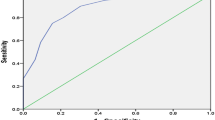Abstract
Attenders of health care facilities usually present somatic complaints. It is important to identify the psychiatric patients among them, especially the neurotic complainers. They are at risk for being exposed to expensive somatic investigations and being prescribed useless and sometimes harmful drug treatment. The World Health Organization designed the Self Reporting Questionnaire (SRQ), to be a universally applicable psychiatric case finding instrument, for use in medical clinics. A feasibility study with this instrument was carried out with 110 respondents in Ethiopia. A moderate criterion validity was found, limitations being partly due to the sensitivity of the SRQ to help-seeking behavior, even in the absence of any mental illness. This study also revealed problems in transcultural communication because many of the diagnostic concepts used in this instrument were too western to be transposed unchanged to the Ethiopian culture. Items need fairly extensive modification to be applicable there.
Similar content being viewed by others
References
Cleary, P.D., B.T. Bush, and L.G. Kessler 1987 Evaluating the Use of Mental Health Screening Scales in Primary Care Settings Using Receiver Operating Characteristic Curves. Medical Care 25: S90-S98.
Dhadphale, M., R.H. Ellison, and L. Griffin 1983 The Frequency of Psychiatric Disorders Among Patients Attending Semi-Urban and Rural General Outpatient Clinics in Kenya. British J of Psychiatry 142: 379–383.
Dilling, H., S. Weyener, and I. Enden 1978 Patienten mit psychischen Störungen in den Allgemeinpraxis and ihre psychischen Überweisungsbedilrftigkeit. In Psychiatrische Epidemiologie. M. Häfner, ed. Heidelberg: Springer.
Diop, B., R. Collignon, Guère, and T.W. Harding 1982 Diagnosis and Symptoms of Mental Disorder in a Rural Area of Senegal. African J of Medicine and Medical Sciences 11: 95–103.
Fabrega, H. 1987 Psychiatric Diagnosis. A Cultural Perspective. J of Nervous and Mental Disease 175: 383–394.
Foulds, G.A., and K. Hope 1968 Manual of the Symptom Sign Inventory (SSI). London: University of London Press.
Giel, R., and C.P.J. le Nobel 1971 Psychische stoornissen in een Nederlands dorp. Nederlands Tijdschrift voor Geneeskunde 115: 949–954.
Goldberg. D.P. et al. 1970 A Standardized Psychiatric Interview for Use in Community Surveys. British J of Preventive and Social Medicine 24: 18–23.
Goldberg, D., and P. Huxley 1980 Mental Illness in the Community. New York, London: Tavistock Publications.
Harding, T.W. et al. 1980 Mental Disorders in Primary Health Care: A Study of Their Frequency and Diagnosis in Four Developing Countries. Psychological Medicine 10: 231–241.
Harding, T.W. et al. 1983 The WHO Collaborative Study on Strategies for Extending Mental Health Care, II: The Development of New Research Methods. American J of Psychiatry 140:27–32.
Jong, J. de, G.A.J. de Klein, and S. ten Horn 1986 A Baseline Study on Mental Disorders in Guiné-Bissau. British J of Psychiatry 148:27–32.
Kleinman, A. 1986 Social Origins of Distress and Disease: Depression, Neurasthenia and Pain in Modem China. New Haven: Yale University Press.
Kortmann, F. 1986 Problemen in transculturele communicatie — De Self Reporting Questionnaireen de psychiatrie in Ethiopië. Assen, The Netherlands: Van Gorcum and Company.
Kortmann, F., and S. ten Horn 1988 Comprehension and Motivation in Responses to a Psychiatric Screening Instrument. British J of Psychiatry 153: 95–101.
Levine, D.N. 1965 Wax and Gold. Tradition and Innovation in Ethiopian Culture. Chicago: University of Chicago Press.
Mari, J.J., and P. Williams 1985 A Comparison of the Validity of Two Psychiatric Screening Questionnaires (GHQ-12 and SRQ-2) in Brazil, Using Relative Operation. Characteristic (ROC) Analysis. Psychological Medicine 15: 651–659.
McNeill, B.J., E. Keeler, and S.J. Adelstein 1975 Primer on Certain Elements of Medical Decision Making. New England J of Medicine 293: 211–215.
Orley, J., and J.K. Wing 1979 Psychiatric Disorders in Two African Villages. Archives of General Psychiatry 36: 513–520.
Ullendorff, E. 1973 The Ethiopians. An Introduction to Country and People (3rd edition). Oxford: Oxford University Press.
Wing, J.K., J.E. Cooper, and N. Sartorius 1974 The Description and Classification of Psychiatric Symptoms: An Introductory Manual for the PSE and CATEGO System. London: Cambridge University Press.
Workneh, F., and R. Giel The Medical Certificate: A Double Dilemma. Ethiopian Medical J 19:63–66.
Author information
Authors and Affiliations
Rights and permissions
About this article
Cite this article
Kortmann, F. Psychiatric case finding in Ethiopia: Shortcomings of the self reporting questionnaire. Cult Med Psych 14, 381–391 (1990). https://doi.org/10.1007/BF00117562
Issue Date:
DOI: https://doi.org/10.1007/BF00117562




